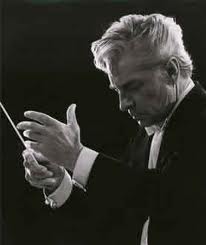
Rehearsing an Orchestra: Herbert von Karajan. Part V. A Conducting Primer by Leonid Grin
Part V.
Herbert von Karajan, the perfectionist.

The first
time Leonid Grin met Herbert von Karajan was in 1969 when Karajan brought the Berlin
Philharmonic to the Soviet Union on tour.
“He gave a master class for conductors in St. Petersburg and I was at that
master class,” said Grin, who was 22 at the time. “I have an amount of beautiful and very
interesting notes. He (Karajan) said, for
example, ‘The worst enemy of music is the bar line. The best music was written at the time of
Gregorian chant, when there were no bar lines.
That’s the way music should flow.’
“Karajan was
a perfectionist,” said Grin, in a discussion of rehearsal styles at the 2010
Neeme Järvi Summer Academy in Pärnu, Estonia.
“He would very, very meticulously destroy these divisions, the
four-measure phrases, bar by bar, phrase by phrase. He was very conscientious about achieving a
fliessend (“flowing”) mood.”
Grin showed
the class a video of Karajan rehearsing Schumann’s Fourth Symphony with the
Berlin Philharmonic. “The first note is
just A. He works this one note four times with the
Berlin Philharmonic. His goal is the
quality of the sound. If the color of
that one note is wrong, then the string entrance will be wrong. It should tune the whole orchestra into the
timbre, the intensity of the vibrato and the coordination. He works it until the tone that comes is what
he wants.”
So it was in
Karajan’s 1969 master class in St. Petersburg, said Grin, who immigrated to New York in 1981. "There was a place in the Brahms Third Symphony
where a brass chord was met by string pizzicato.
There was an audience. The
conductor conducted and Karajan said to them (the audience not the orchestra) ‘Das
ist falsch’ (“That is false.”). He didn’t
turn to the orchestra, he didn’t stand up.
He was talking about pitches. The
orchestra understood and played superbly.
He was like a magnet.
“ Some
people are blessed with that gift,” said Grin.
“He was sitting with his back to them (the orchestra), but he
concentrated that power. Of course
everybody was watching him, but he was like a madman holding us all
together. And he was working with young
conductors. We were breathing with him,
and it was perfect.”
Karajan’s
practice was never to leave work unfinished, said Grin. “If you start to rehearse something, never
move forward until you are really satisfied.”
Next: Sergiu
Celibidache.